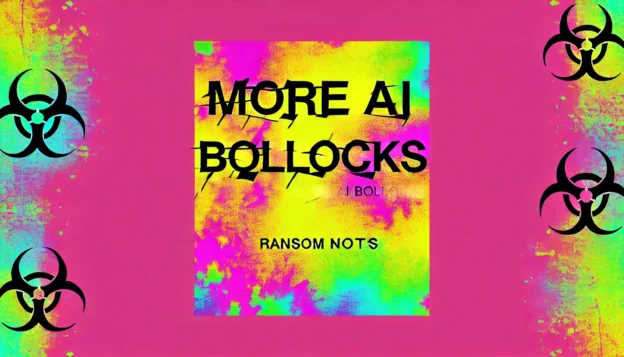Every day, a new headline emerges about artificial intelligence (AI), promising either salvation or doom. From “AI will replace all jobs” to “AI will cure cancer,” the relentless marketing of AI solutions can make it seem like we’re on the brink of a utopia, or dystopia, depending on who you ask. But amidst all the buzz and excitement, a lot of it is, frankly, bollocks.
Let’s break down why much of what we hear about AI is overblown and what we should really be focusing on as we dive head-first into part one of my series of satirical comedic polemics.
Overpromised, Under-delivered
Remember when AI was going to revolutionise healthcare by diagnosing illnesses better than doctors? Or when self-driving cars were just around the corner, ready to replace human drivers? Well, years have passed, and while there have been some impressive advances, we’re far from the sweeping changes many predicted.
Part of the problem is that AI is often treated like a magic wand, something that can instantly solve complex problems. But the reality is more nuanced. AI systems are great at narrow tasks, such as identifying patterns in large datasets or automating repetitive processes, but they struggle with general intelligence, the kind that humans excel at, involving creativity, empathy, and critical thinking.
AI Is Not Skynet
Hollywood’s portrayal of AI as a malevolent force destined to enslave humanity has fuelled unnecessary fear. The truth is that today’s AI is far from sentient. It’s not plotting your demise or scheming to overthrow governments. What we currently have are advanced algorithms that process data in ways that mimic certain cognitive functions but without any true understanding or awareness.
Yes, AI can make decisions and perform tasks that seem intelligent, but it’s not conscious, and it doesn’t have desires or intentions. So, the idea that AI will “take over” anytime soon is pure bollocks. Singularity anyone? I don’t think so.
Jobs Won’t Disappear Overnight
A common trope in the AI discourse is that robots are coming for your job. In reality, while some jobs will be automated, others will evolve or be created. Historically, technological advancements have disrupted industries, but they’ve also led to new opportunities. The industrial revolution didn’t eliminate work; it transformed it. AI will likely do the same.
Of course, the transition won’t be easy for everyone. Some sectors will face significant upheaval, and there’s a genuine need for upskilling and reskilling. But the blanket narrative that AI will cause mass unemployment is an oversimplification that overlooks how technology and society adapt together.
AI Ethics: Buzzword or Necessity?
Every tech company today loves to talk about “AI ethics,” but what does that really mean? In many cases, it’s little more than lip service. The truth is, that ethical issues surrounding AI, such as bias in algorithms, data privacy, and accountability, are real and pressing. However, the way these concerns are often handled is by slapping a label on them without taking meaningful action.
To make AI genuinely beneficial and fair, we need strong regulatory frameworks, transparency, and a deeper understanding of how these technologies impact different communities. But a lot of what we see today is window dressing, companies claiming to prioritise ethics while developing systems that perpetuate inequality or invade privacy.
The “AI” in Your Product Might Not Be AI at All
It seems that everything is powered by AI these days, from your toothbrush to your fridge. But much of what’s marketed as AI is just clever programming or basic automation. Slapping an “AI-powered” label on products is an easy way for companies to inflate their value and charge more, even if there’s nothing particularly intelligent going on behind the scenes.
True AI, the kind that involves machine learning and neural networks, is expensive, complex, and requires a lot of data. So, unless you’re dealing with big tech companies or specialised applications, chances are the AI you’re interacting with isn’t as cutting-edge as it’s made out to be.
Stop Drinking the AI Kool-Aid
The relentless AI hype cycle is fuelled by venture capitalists, tech companies, and media outlets eager to capitalise on the buzz. They tout AI as the next great frontier, the cure for all societal ills, while conveniently ignoring its limitations and risks. This leads to unrealistic expectations and, often, poor decision-making at both organisational and policy levels.
We should stop blindly worshipping at the altar of AI and start critically evaluating what it can and cannot do. AI is a tool, one that can be incredibly powerful when used correctly, but also dangerous if misused or misunderstood. Treating it as a panacea or as an unstoppable force of nature does more harm than good.
Conclusion: Cutting Through the Bollocks
The key to navigating the AI landscape is to separate the real progress from the hype. Yes, AI is advancing, and yes, it will have a profound impact on many aspects of our lives. But we must approach these developments with a critical eye, aware of the limitations, risks, and overblown promises that surround it.
Let’s stop the sensationalism and focus on what matters: using AI responsibly, ethically, and intelligently. Anything less is just more AI bollocks.
